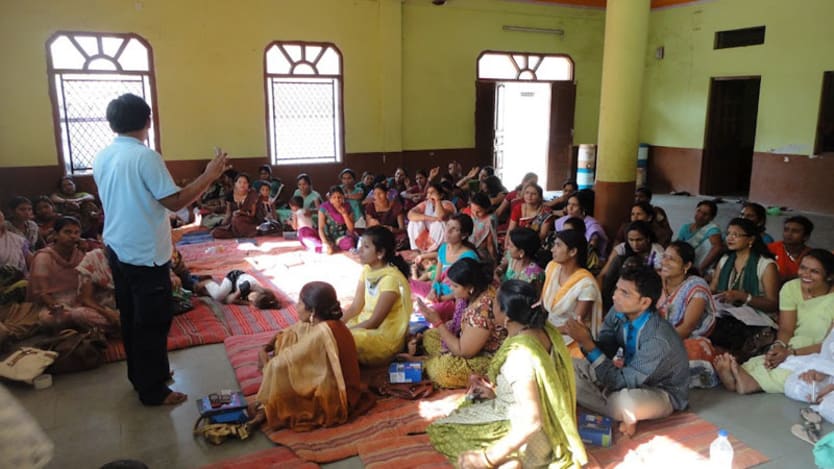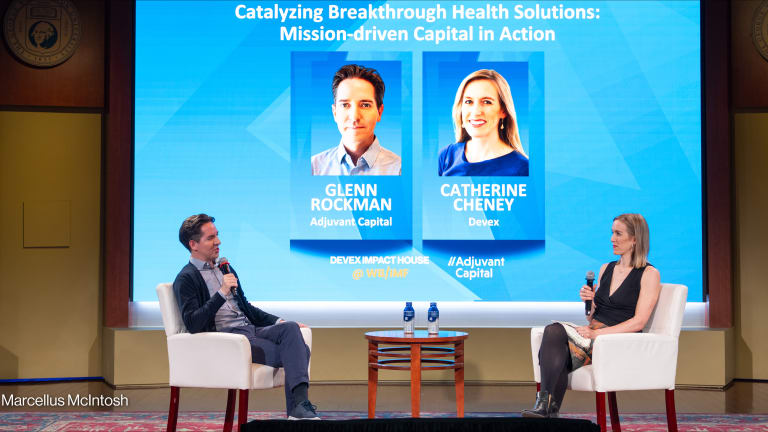
Social entrepreneurs dream of changing the world — but to achieve more than pockets of success, they need to operate at scale.
Yet many companies get trapped in the “missing middle” — or “the valley of death” — too small to get loans from commercial banks and too big for microfinance.
Support services are starting to fill the gaps. Open Capital Advisors helps entrepreneurs who are seeking investment but are ill-prepared to talk about their strategy and what they need to get there. Mango Fund, an impact investment fund, specializes in the “missing middle”. And the United States Agency for International Development’s Development Innovation Ventures Fund provides staged financing, from $25,000 to $15 million, to support businesses from proof of concept to expansion.
This support ecosystem, however, could be more effective and better coordinated. Until that happens, the onus remains on the entrepreneur. Devex spoke to a range of entrepreneurs and organizations working to help them navigate growth in East Africa, who shared five things that entrepreneurs can do to set themselves up for scale.
1. Get the business model right.
“If you want to be a social business, you have to be a business first,” said Andrew White, director for Uganda expansion at Bridge International Academies, which has opened more than 400 private schools in East Africa in the past six years and is supported by a group of investors that includes the Bill & Melinda Gates Foundation and Mark Zuckerberg.
“The first thing the investor is going to do is look at our accounting books … they want to see what the return is on their investment,” he said.
Indeed, for investors like the East Africa Acumen Fund “commercial viability is as critical as social,” said Duncan Onyango, the fund’s regional director.
Ideally, a model would combine both and builds a social mission into the business plan. Pearl Capital Partners, an agriculture investment firm, has evolved from choosing enterprises based on social objectives to one that targets businesses where those objectives are met as a result of commercial success.
The old model often required investors to sacrifice financial gains, which was problematic, but “we believe the model we are working with now is more sustainable,” said Wanjohi Ndagu, a partner at Pearl Capital Partners.
2. Have a plan and prove your impact.
Successful social enterprises will have a better chance of attracting the kind of investment they need for growth if they have a structured plan and an understanding of how each stage of capital will support it.
A clear trajectory will help get the investor “on the same page,” especially if they can link future plans to a proven track record, said Nicole DeMarsh from Open Capital Advisors.
Investors want to see a business plan, even one that only looks out 12-24 months, said Ndagu.
“Something as simple as record-keeping really advances your agenda in accessing capital,” he said.
Rigorous data collection is also crucial. Educate!, which promotes experience-based education and has expanded from 54 Ugandan schools in 2013, to 238 schools in 2014, prides itself on its “aggressive” impact measurement: it gathers more than 20 indicators via SMS and smartphone technology that monitored on a weekly, monthly, trimesterly, or annual basis. This M&E system is “a huge part of what’s helped us grow,” said Elana Pollak, an external relations associate at Educate!
3. Get the right people.
A good idea or invention is one thing, but without a good core team to build the business it won’t scale. Social enterprises therefore need to be able to identify their weaknesses and bring on staff to fill the gaps.
Running a social business is a delicate “balancing act,” but assembling a strong board of trustees with a good mix of commercial and social expertise can help manage that, said Titus van der Spek, a researcher on social entrepreneurship.
The right mix of skills and experience can help startups like Jibu, a water franchising company in Uganda and a participant in the Unreasonable East Africa incubator, have a greater chance of growth, said Joachim Ewechu, founder of Unreasonable East Africa. Jibu expanded from three to 15 stores in 2015.
“You [may have] really cool ideas, but do you have the right team in place to execute that idea? The strategy surrounds that, raising capital surrounds that,” he said. “If you don’t have the right people, do you have a plan to bring on the right people to help you grow?”
4. Proactively search for partners.
Partners that can provide access to markets or opportunities and are invested in helping improve the business are also an important tool to scale.
For the Aryodi Bee Farm in Northern Uganda, one Dutch partner has helped the company understand and gain access to the export market for beeswax. And for STiR Education, the next step to scale from 3,000 to 30,000 teachers by 2020 is a partnership with government, but they wouldn’t be in a position to do so without past partnerships.
“It was important in the first few years to identify really high quality [NGO] partners, so that the risk was minimal — we knew they were already delivering good work,” Reinier Terwindt, M&E lead at STiR.
How do you find a partner? Accelerators can provide introductions — but entrepreneurs can also be proactive, said Carolyne Kirabo, a consultant at Yunus Social Business. Aryodi’s founder found his Dutch partner simply by reaching out online, she said.
“I’ve met a lot of entrepreneurs who don’t network, and those who intentionally network — there’s always a big difference,” Kirabo said.
5. Innovate and adapt.
Achieving scale will require adaption and companies that try to grow, while assuming they can continue to operate in the same way are less likely to succeed.
“There’s a certain comfort to: ‘I learned this, and this is what I do and growth simply means more revenue in doing the same thing,’” Kirabo said. “[But] the way one thing works in one region does not mean it’s going to work the same [elsewhere]. Replication means you still want to make the same impact but — for example — you’re going to have to make the product more attractive, or address more core issues.”
Enterprises also need to adapt internally. A social venture is likely to be supported largely by NGOs, through grants, early on, and by investors, through with loans or equity, later as they mature. Who an enterprise works with will affect the structure of the business, the communication style, and how and what is reported, said van der Spek.
Join Devex to network with peers, discover talent and forge new partnerships in international development — it’s free. Then sign up for the Devex Impact newsletter to receive cutting-edge news and analysis at the intersection of business and development.








